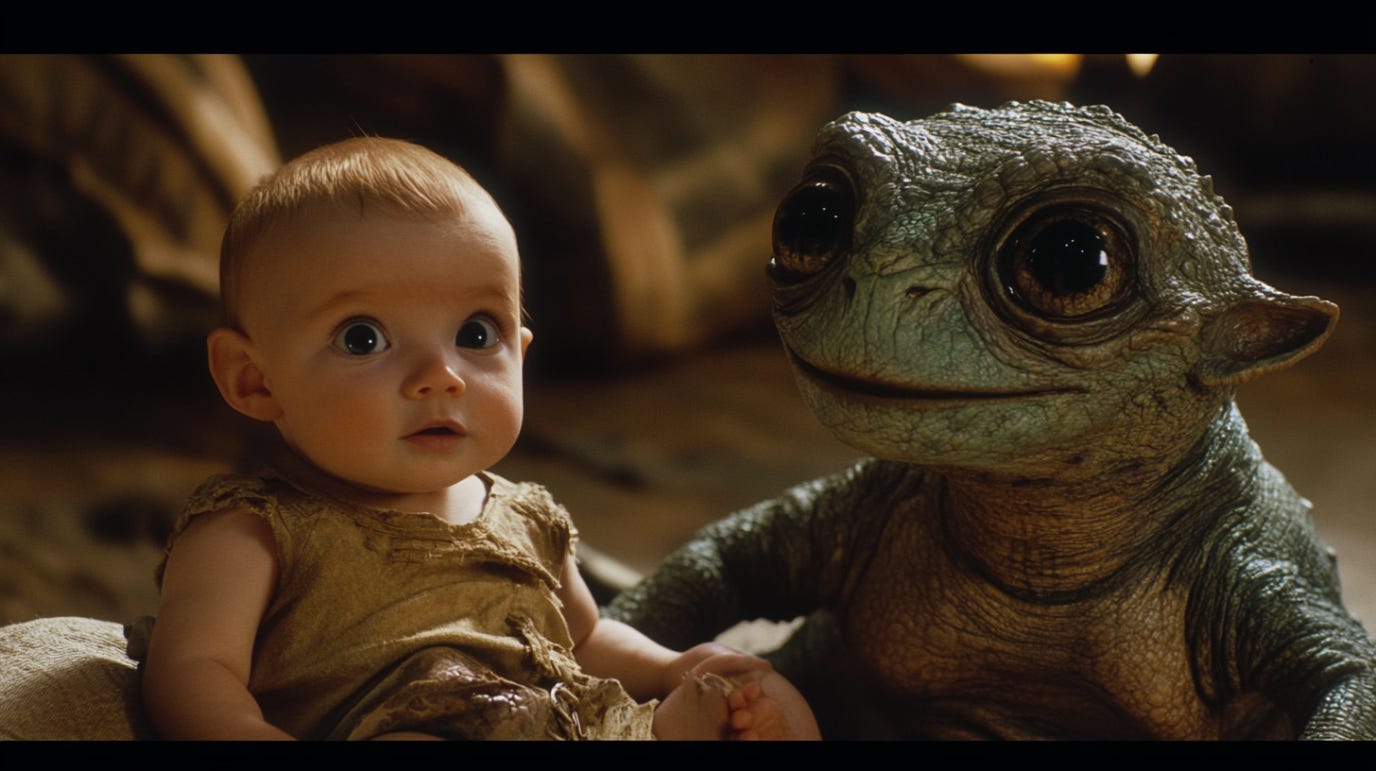The Internet is Killing Our Childhoods
And not just for today's kids.
Every person lives two separate childhoods: the childhood you remember and your childhood as it actually was.
Many of us look back at our youthful days with a nostalgic gaze. We remember the days when we were able to run outside the house and play with our friends. The television shows we watched were the best popular culture has ever produced. Getting to eat at McDonald’s was the best gift your parents could grant you.
They were the days when you had no responsibilities. No bill collectors were calling you, you didn’t have kids of your own to take care of, and no boss was on your back telling you that you were screwing up at work.
This desire for people to reclaim their childhoods has driven the decades-long obsession with nostalgia. Grown men still buy tickets weeks in advance for new Star Wars and Marvel superhero movies. Women in their 40s shell over hundreds of dollars to go see New Kids on the Block.
In the past, reminiscing about childhood was fun because all the experiences and culture you’d think about were in the past. But the internet has changed all that - culture that normally would have faded into oblivion is now available online at all times. For many people, that means never growing out of their childhood passions. But for other people, it means realizing the stuff you loved as a kid was actually terrible.
I recently caught a clip of the TV show “Land of the Lost,” (not to be confused with the 2009 Will Ferrell movie), which ran from 1974 to 1977. As a kid, I couldn’t wait to see the clumsy special effects and dopey masks the actors playing the “Sleestaks” had to wear:
In past years, I could have fondly remembered those episodes as relics from my youth, never stumbling on them again. But now, the internet makes sure we live in all the eras all at once. And when you actually see the stuff you enjoyed as a kid, you start to understand that maybe you weren’t the little genius your parents thought you were. You easily fell prey to horrifying costumes, bad acting, and hackneyed plotlines. Your once pristine taste in television retroactively takes a hit.
One of my prized bits of pop culture paraphernalia is my t-shirt adorned with the name of the bar from the sitcom “Three’s Company.” The Regal Beagle was the swinging hangout where neighbor Larry would always go to pick up the ladies and the roommates would hash out their misunderstandings.
And while a lot of people don’t get the reference, those that get it…REALLY get it. (If you’re looking for attention from women in their 40s and 50s, get one and wear it while walking around Target. You’ll be like Margot Robbie walking by a construction site.)
But go back and watch some “Three’s Company” episodes. They’re not that good! Virtually every episode hinges on some sort of misunderstanding that could easily be cleared up, but which ends with Mr Furley or Mr. Roper overhearing some sexually suggestive comments through a door without knowing the context. It may be the most formulaic show that has ever existed - and you can watch them all right now on various streaming services. (Editorial note: in the great debate over the better “Three’s Company” landlord, I am Team Furley, now and forever - how can you not honor a man in his 70s with drip like this?)
This whole effect pops up a lot in discussions of “Saturday Night Live,” typically when people argue the show isn’t as good as it used to be. Their memories immediately flash back to their younger years, when Chris Farley was doing Matt Foley (the “van down by the river” guy) or Eddie Murphy was appearing as Buckwheat or Mr. Robinson every other week.
But watching all the SNLs in order (as I am almost done doing) tells a very different story - some of the earlier seasons are stuffed with unfunny filler, with only occasional flashes of brilliance. Our brains just remember the good stuff and push out the bad, then assume the modern show doesn’t meet that standard.
The internet also makes it easy to debunk some of your greatest childhood memories. Take, for instance, my recollection of the first time I ever went to a Major League baseball game: It was 1981, and the heavily mustachioed Milwaukee Brewers were on their way to their first playoff appearance.
As I walked into Milwaukee County Stadium on that warm night, my eyes grew to the size of manhole covers - I had never been in a stadium packed to capacity before. Tommy John was on the mound for the hated New York Yankees; the Brewers' Gorman Thomas hit two home runs, and my dad and I went home as happy and worn out as if we had played the game ourselves.
There's only one problem with my fondest of memories: None of it is true. The only game Tommy John pitched in County Stadium in 1981 was on Sept. 14, and the Yankees hammered the Brewers, 10-2. The crowd that night was a tepid 17,545, and the temperature at game time was an unseasonably chilly 62. The only Brewers home run was hit by catcher Charlie Moore.
I was able to find this all out with a couple of clicks. And now I retroactively feel like a completely different person. What if my childhood is all lies? Who am I as a person if the things I consider to be personal building blocks are all hallucinations?
In some respects, it’s probably good if we remember our childhoods more fondly. I grew up in the 1970s, and it was a horrible time. The headlines from the year I was born are depressing: Richard Nixon was in the middle of the Watergate scandal and America had just left Vietnam. Gas shortages were around the corner. Charles Manson had just been convicted. Five years previously, Robert F. Kennedy and Martin Luther King, Jr. were shot to death in public.
So maybe it’s good to view one’s childhood through a soft lens - kids deserve a break, and no one wants to believe their personality was forged from the most traumatic events of the time. But in 2025, the availability of information contradicting the things you remember fondly only weakens the foundation of your personality. If “Star Wars” isn’t as good as I thought it was when I was seven years old, who even am I?
So while you read article after article about how the internet is killing childhood for current kids, keep in mind the problem is even worse. It’s damaging the childhoods of adults, as well.
ALSO:
There seems to still be a lot of confusion over President Donald Trump’s tariff policies, especially since Trump changes them on a weekly (or sometimes hourly) basis.
But here’s an analysis of what tariffs - import taxes levied on many of our strongest trade allies - will mean for my state, Wisconsin.
Consider that the median household income in Wisconsin is $74,631. That comes out to about $2,225 per pay period after taxes (though this is variable; Wisconsin taxes range from 3.50% to 7.65%).
Wisconsin has the lowest grocery bills in America, with $221.46 spent per week, or $442.92 per pay period.
At the Aldi (a discount grocery store) in Wisconsin’s 53001 zip code, bananas are imported, and currently retail for $0.48 per pound, or $0.16 per fruit.
Mexico, meanwhile, exports 489 million pounds of bananas to the U.S. To the extent Aldi’s bananas are Mexican, tariff hikes will mean that for ten bananas, the price would increase from $1.60 to $2.00.
At the same store, broccoli is imported and currently retails for $2.15 per pound. Mexico is the biggest exporter of broccoli to the U.S., so to the extent Aldi’s broccoli is Mexican, tariff hikes will mean a pound of broccoli will increase from $2.15 to about $2.70.
The examples go on and on. A three-pound bag of onions that currently retails for $2.55 will increase to just under $3.20 per bag. A 12-ounce container of orange juice concentrate would increase from $3.15 to just under $3.95. A 42-ounce container of oats (imported both from Canada and Mexico) would increase from $4.35 to just under $5.45. And with tariffs on Canadian potatoes, a 32-ounce bag of tater tots would increase from $3.19 to just under $4.00.
In summary, price hikes from just these six foods, none of which are luxury items, could add $5 a week to a family’s shopping bill in the cheapest state in the nation for groceries.
That doesn’t sound like “reducing inflation,” does it?
ALSO:
The latest episode of my “Saturday Night Live” podcast, “Wasn’t That Special,” is now up. We cover Season 44, which ran from 2018 to 2019.
FINALLY:
This music pick won’t be for everyone, but UK-based punk band Lambrini Girls recently released their debut album, and it’s really a sonic gem. It’s brash, it’s profane, and often obnoxious, but it’s head-bobbing stuff - if you can handle its ridiculous lyrical content (which is kind of the point of punk music), it’s a nice throwback to the guitar rock days of the 90s.
Here’s one of their gentler tracks, “Love:”





